The book begins by discussing mothers' intituition and their feelings that "something’s not quite right with my child.” A Special Mother continues through the stages of denying that anything is seriously wrong, the eventual diagnosis, and advocacy.
For me, I could identify with many of the mothers who shared their experiences with knowing something wasn't quite right with her child, but not being able to pinpoint the cause. Olivia, who was adopted as a ten-month old infant from China, was diagnosed with a host of medical problems and developmental delays when she had her initial evaluation at the University of Minnesota's International Clinic. (The referral said she was a healthy baby with no medical problems.)
By the age of three years old, at my request, she was evaluated by several teachers and therapists in the local school district who helped identified some special needs and a plan for reaching developmental, cognitive, and speech goals.
For about two years, she worked with this team of professionals who provided guidance and therapy to help her reach her goals in combination with therapy and learning activities that they asked that I would do at home with Olivia.
Olivia playing with Oodles of Ooze
that I made for her. It was meant to
strengthen her hands and
get her comfortable with different textures.
Concurrently, Olivia was diagnosed with Sensory Processing Disorder (a.k.a. Sensory Integration Dysfunction) and went through an intense ten-day, full-day program at Special Children Center in Hudson, Wisconsin. She had many follow-up sessions to help address on-going issues that were too great for the district to handle.
Olivia doing therapeutic horseback riding in 2007.
She was 4 years old in this picture.
Olivia also began therapeutic horseback riding at age three through Courage Riders and later participated in River Valley Riders' program as well. These two programs provided physical therapy, occupational therapy, cognitive therapy, speech therapy, and body/muscle strengthening...not to mention a love for horses and horseback riding.
When she first began riding, she could barely sit up straight (she was hypotonic which basically means she had no muscle tone in her hips or upper arms/shoulder area) and couldn't put more than one word together. Her language was at a standstill for a long time, and most of it was being done through American Sign Language.
Within the first six-week session of therapeutic horseback riding, she put her first two words together! It was huge breakthrough. Now, five years later she can sit straight up on a horse and can compose multi-word sentences. In fact, she is almost always talking. She even still remembers some of the ASL signs she used as a toddler and young child.
Olivia exercising while horseback riding
For the past five years (from age 3-8 years old), Olivia has been seeing an opthamologist on a quarterly basis since she is legally blind in both eyes (without glasses). Her left eye is substantially worse than her right eye, so it was recommended that she wear a patch on her right eye so that her brain would be forced to use her left eye. In this way, it would strengthen her vision and prevent a complete loss of vision in her weaker eye.
She also was receiving nightly medicine in her eyes so her lashes wouldn't scratch her corneas. About eight months ago, her lashes began moving away from her corneas and no longer were scratching them. This medicine has been stopped which has been nice.
I had Olivia work on a variety of projects while she wore
her patch so it would even further help use the eye.
Here she is doing embroidery and
making a wool felt pencil case
Which brings her to second grade where I was noticing persistent challenges with speech/communication issues. So, in Fall 2010, I approached the school district and requested an evaluation of her speech skills. She qualified for services and has been going to speech therapy once a week since November 2010.
Each week, her speech therapist (Laurie) gives Olivia several books to read at home. She started at a very basic level since I had intentionally waited to have her begin reading. (I was following the Waldorf philosophy in terms of reading as I had done with my older daughter, Sophia who waited until the end of first grade/beginning of 2nd grade to read. She is now in 4th grade and reads at the late-5th grade level and has a comprehension level of an early-7th grader.)
Olivia trying her best with Explore the Code -
part of her reading/language arts lessons
At this point, I wasn't noticing anything much different from Sophia's start in reading. Reading was difficult for both of them, but they forged ahead with their reading assignments. However, within a few weeks, Olivia's ability to recall simple words that she read in previous weeks was not strong. She would get highly frustrated with reading - almost to the point of tears. This was very unlike Sophia's reading experience. I expressed concern to Laurie.
Laurie and I agreed to wait a bit longer to see if reading became any easier for Olivia. It did not. At that time, I requested testing for both reading and math (since she must use manipulatives in order to arrive at the right answer).
I met with a group of eight women who made up the special education team/school administration. I had to make a presentation about Olivia's skills, concerns I had, and provide samples of her work.
Olivia doing math with manipulatives.
She's using shells on this day, but also uses sticks,
rocks, and other natural items.
After reviewing the materials and listening to my concerns, the team decided to move forward with testing while doing concurrent at-home interventions and testing for six weeks. Although they didn't anticipate the interventions/testing to improve during the six weeks, it is a necessary step in the paperwork they need to file with the state.
Olivia now has gone through a battery of tests by a special education teacher, an occupational therapist, speech therapist, and psychologist. I've completed quite a few questionnaires and checklists that provide a different view of Olivia (from both a parent and teacher perspective).
At this stage, it looks like she will qualify to receive services under the "learning disability" label. I'll know more specifically what her challenges are next week, but at this stage I do know that one thing she is definitely struggling with is short-term auditory memory and a bit of perceptual reasoning. The tests that the different professionals did all will reveal more specific problems and areas with which she will need assistance.
So, going back to the book I read this week, A Special Mother, it was with interest that I read about the evaluation/assessment process, the written report, evalutation meeting, and IEP (Individualized Education Program). The latter three items are forthcoming during the first two weeks of April, so it was valuable to get an overview of what to expect, read about a child's educational rights, and see the wealth of resources available for parents of children with LD, autism, and other developmental learning disorders.
Even though I've been through the process when Olivia was much younger, it is a bit different now that she's moved from the "developmental delays" label and into the "learning disabilities" label. The former, to me, is more transitory and something that can be worked through whereas the latter is, as it notes in A Special Mother, "...a neurological disorder.
"In other words, it results from a difference in the way a person's brain is 'wired.' A learning disability means that a person of at least average intelligence will have difficulty acquiring basic academic skills that are essential for success at school and for coping with life in general."
With more than three million children in the United States having been diagnosed with a learning disability, having books and resources for parents is invaluable. It's even more meaningful when the book was written by a parent whose child has a LD. In Anne Ford's case, her daughter Allegra has severe learning disabilities; and it provided the motivation to become an advocate for children with LD.
Reading about the experiences of Anne - as well as many other mothers profiled in the book - helps mothers realize that they are not alone...and that they can help their child to thrive. I would highly recommend this book.


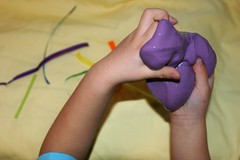
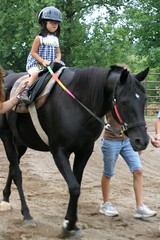
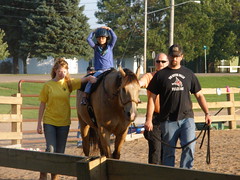
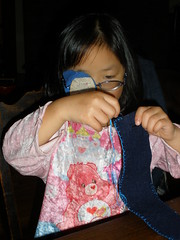
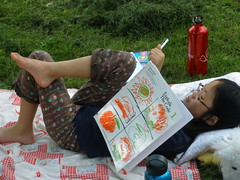

1 comment:
Wow, what a great mother you are!
My kids all learned to read late (age 9 or so) due to visual processing problems that needed vision therapy to correct.
This book sounds really intriguing, though it might dredge up in my all that anxiety I felt when my kids were younger and we were still trying to figure out how deal with their late blooming. Homeschooling rocks that way!
Thanks for the review.
Post a Comment